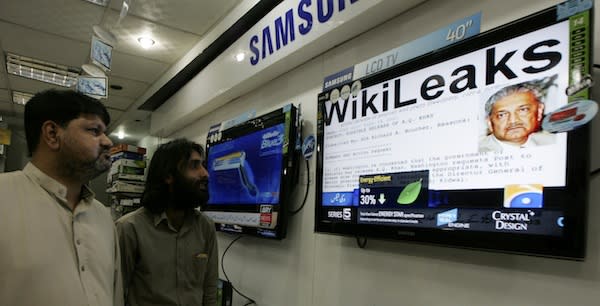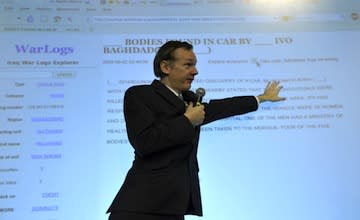 The Cutline
The CutlineSome news outlets stop calling WikiLeaks a ‘whistle-blower’

WikiLeaks' critics haven't been shy in their characterizations of the online document clearinghouse over the past week. The Senate's Republican leader, Mitch McConnell of Kentucky, blasted editor-in-chief Julian Assange on on "Meet the Press" Sunday as a "high-tech terrorist." And Sen. Joe Lieberman (I-Conn.) recently called WikiLeaks' publication of some of its 250,000 State Department cables "outrageous, reckless and despicable."
News organizations have seemed less sure about how to describe WikiLeaks, which has provided hundreds of thousands of documents to some media outlets this year regarding Afghanistan, Iraq and diplomacy. Several top outlets are now discarding one word that's often been used to describe the secretive organization: "whistle-blower."
[Related: WikiLeaks sheltered from attack in COld War bunker]
The Associated Press, for one, used "whistle-blower" as recently as Thursday in describing WikiLeaks but has since opted against it.
"We've had 'whistleblower' in some copy but have decided not to use it any longer," AP spokesman Paul Colford told The Cutline. "Our description now reflects the site's own name: a website that specializes in displaying leaked information."
Colford didn't say whether the AP considers "whistle-blower" to be inaccurate. He simply said that "we think we have a better, clearer description, and that's what we're using."
NBC News spokeswoman Lauren Kapp also told The Cutline that the network was retiring "whistle-blower" in its WikiLeaks reports, even though it called WikiLeaks a "whistle-blower" on last Monday's "Nightly News With Brian Williams." Reuters, which has used "whistleblower" since the State Department leak, no longer uses it either. "Our style guidelines ask that reporters not describe WikiLeaks as a whistle-blower," Reuters spokeswoman Erin Kurtz said.
[Related: Assange's Swiss bank accounts frozen]
The term "whistle-blower" is usually used to describe someone within, say, a corporation or government agency who risks a career to speak out against corruption or fraud. It may just seem like a semantic issue, but how the media describe WikiLeaks can affect public perceptions. A whistle-blower is probably viewed positively, as an individual speaking out against wrongdoing.
The Cutline has described WikiLeaks as an "online whistle-blower" in some previous posts. But perhaps if anyone's going to be described as a whistle-blower, it would more accurately be Bradley Manning, the imprisoned Army private believed to have leaked documents to WikiLeaks, because he allegedly committed the action while in the military.

Of course, some of WikiLeaks' critics — who have called Manning treasonous — surely wouldn't consider such a label for either him or WikiLeaks. They probably wouldn't opt for any description that suggests publication of classified documents has had a positive effect. While the documents obtained by WikiLeaks have contained numerous revelations, from the extent of civilian casualties and allegations of torture in Iraq to the intricacies of U.S. foreign policy, critics argue that WikiLeaks' primary motivation is to damage U.S. credibility and security rather than to shine a light on corruption and malfeasance.
[Video: 'SNL' spoofs Assange]
Wall Street Journal columnist L. Gordon Crovitz wrote Monday that "Assange is misunderstood in the media and among digirati as an advocate of transparency." Crovitz argued that the reason Assange launched WikiLeaks "is not that he's a whistleblower — there's no wrongdoing inherent in diplomatic cables — but because he hopes to hobble the U.S."
The White House also doesn't consider it accurate to describe WikiLeaks as a "whistle-blower" and has expressed that view to some news organizations.
"Wikileaks is not a whistle-blowing organization," said White House spokesman Tommy Vietor. "It's a group with an anti-U.S. government agenda that has recklessly released stolen documents that put at risk diplomats, intelligence professionals, and people working to advance the cause of human rights and democracy around the world."
The New York Times, which has obtained documents from WikiLeaks in advance of the Afghanistan and Iraq megaleaks, doesn't have a specific policy on how to describe WikiLeaks. A Friday Times story initially described WikiLeaks in the lede as a "whistle-blowing Web site," but was later changed to simply say "the WikiLeaks organization." On Monday, the Times again went with "whistle-blowing Web site" in a news story.
Phil Corbett, the Times' standards editor, said that the paper doesn't have a specific policy. Corbett said that "whistle-blower" is "probably not an ideal description" since the word is most often used for someone within an organization, but added that he doesn't "have any deep philosophical objection" to using it.
"It is a shorthand and it doesn't tell the reader as much as you want to about what they're really all about," Corbett said. "I think the phrase or description we've used probably more often is a group or organization devoted to revealing secret information, secret documents, from governments or corporations."
The debate over whether WikiLeaks is a truly "whistle-blower" came up over the weekend on NPR's "On the Media."
Ted Devine, who has spent decades with the Government Accountability Project fighting for legal protections for whistle-blowers, told NPR that "it's easier to take cheap shots at whistle-blowers because WikiLeaks has been simplistically given the same kind of label." Devine said he hopes that Congress passes legislation providing "an alternative to anonymously dumping documents" so that potential whistle-blowers will have a way to speak out besides going the WikiLeaks route.
WikiLeaks -- which describes itself as a "nonprofit media organization dedicated to bringing important news and information to the public," and is now being hosted on more than 500 "mirror sites" -- probably wouldn't mind being the go-to source for people looking to leak information.
(Top photo from electronics shop in Karachi, Pakistan, on Dec. 1: AP/Fareed Khan. Bottom photo of Assange at a London news conference Oct. 23: AP/Lennart Preiss.)
Other popular stories on Yahoo!:
• Obama blames busted lip for speech flub
• BP challenging government over spilled oil estimates
• United States commits costly money-printing error

